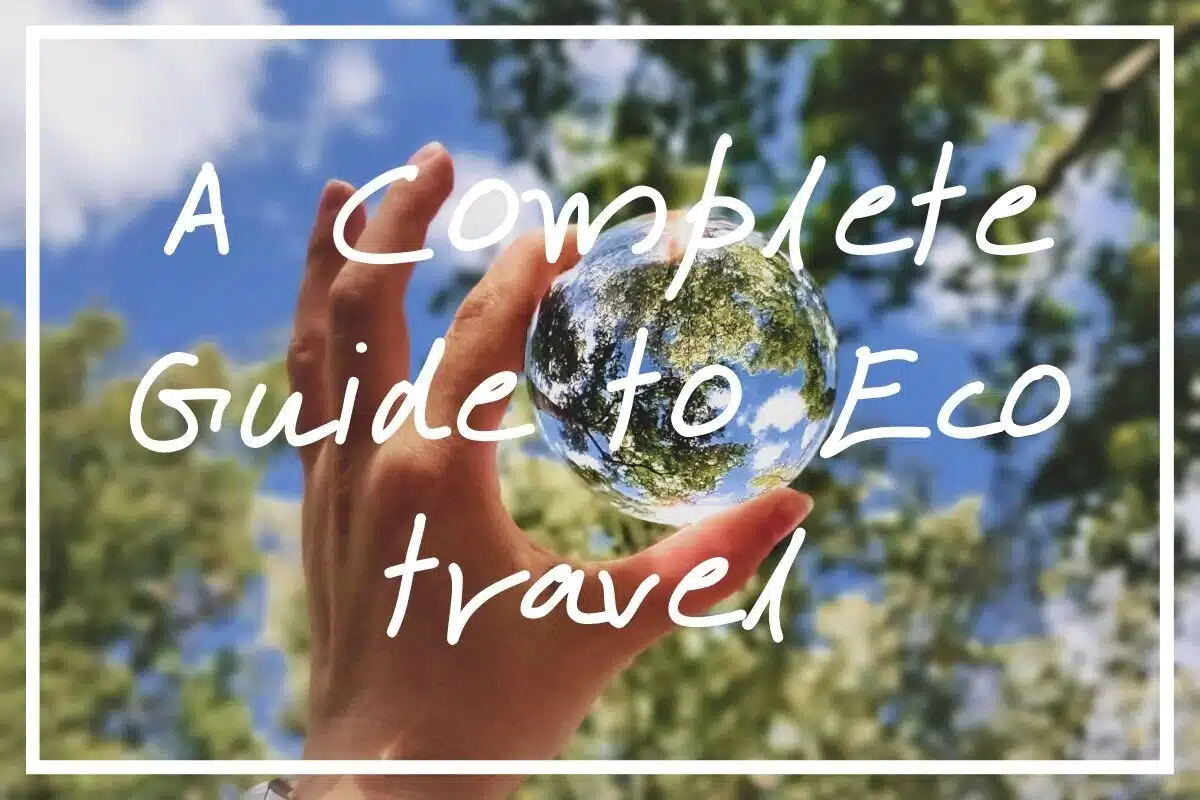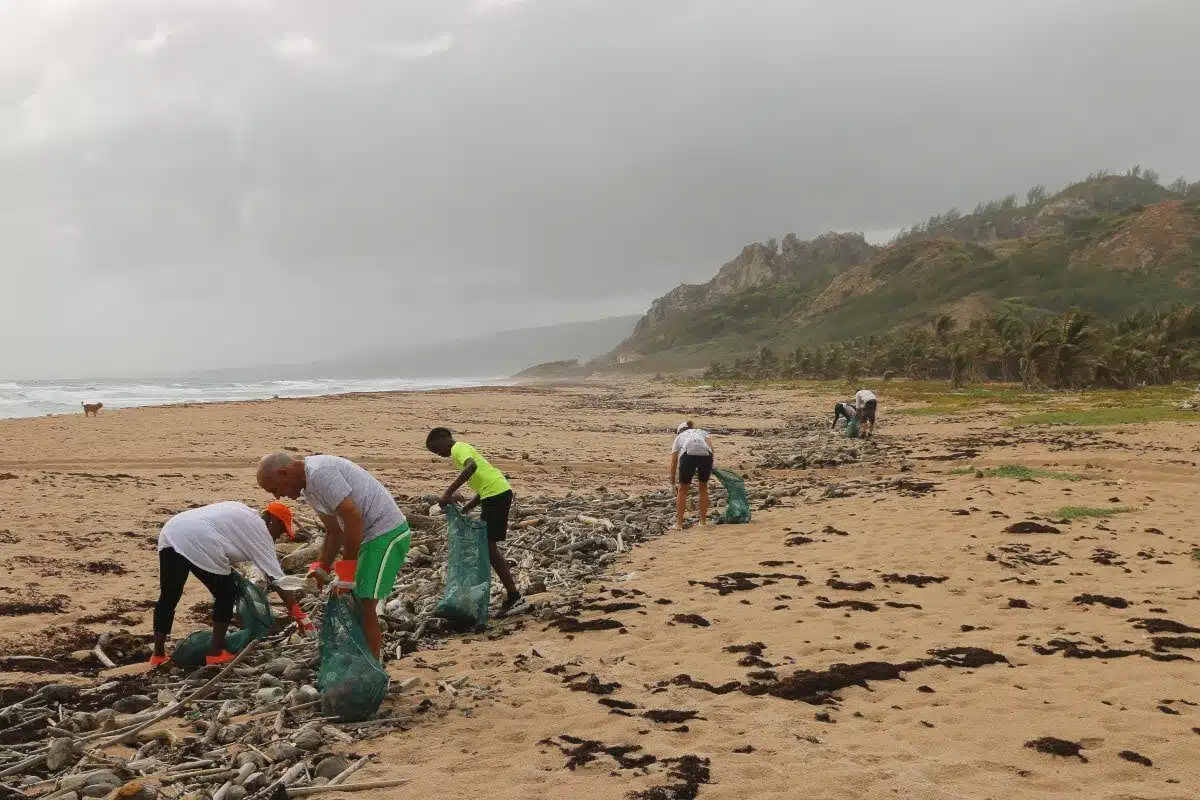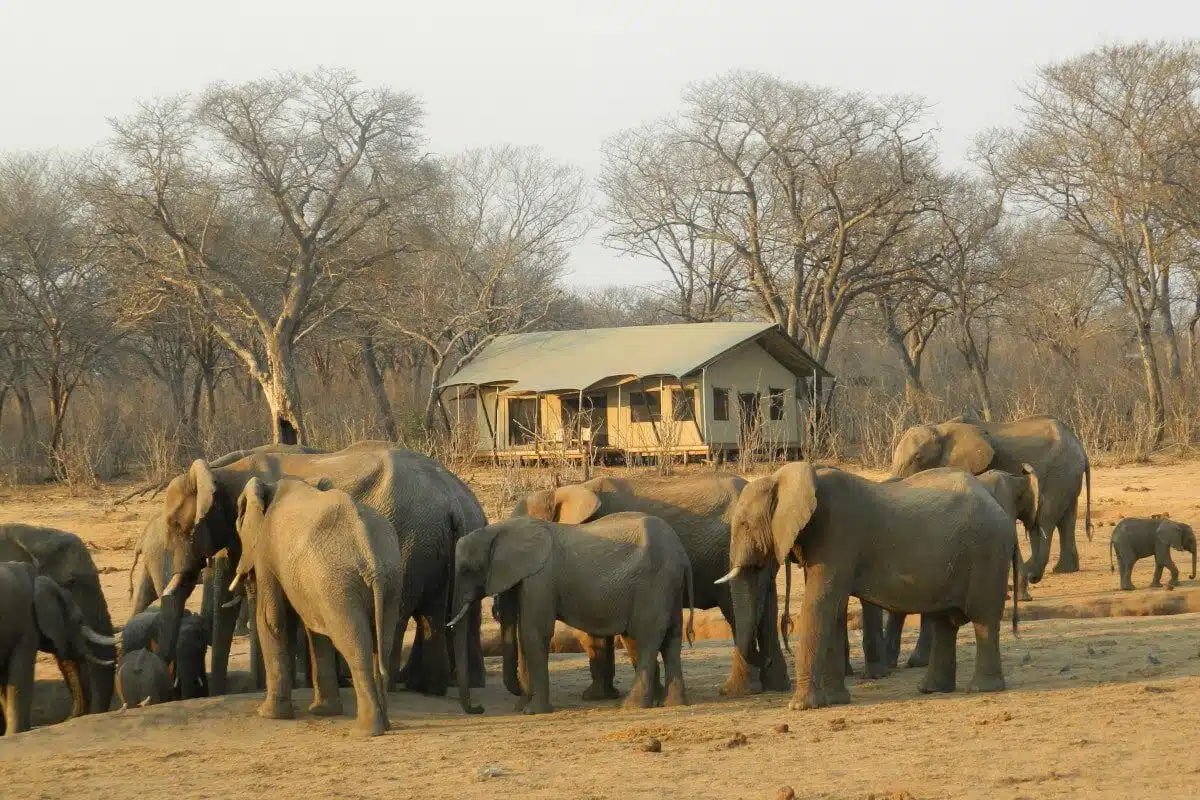Trying to find out about eco travellers? I hope this guide helps!
Do you remember seeing pictures of blue skies in Beijing and dolphins in the canals of Venice during the COVID lockdowns?
That was no coincidence.
Researchers have found that the pandemic had a profound positive effect on the environment, from reducing air and water pollution to reversing the damage done to popular tourist destinations.
These findings have only accelerated a trend that was slowly becoming more popular anyway: eco travel.
You may have heard of eco travelling already. But what is it, exactly? What do eco travellers do? What do eco trips involve? Where are the best places to take eco tours?
And, most importantly, why should you (or any of us) care?
Read on for a deep dive into ecological travelling, why it’s so important, and some expert tips to help you get started!
Here we go, then: a comprehensive look at eco travel and what it involves!
Interested in eco travels? You might also like these posts…
- 10 Primary Disadvantages of Tourism
- A Complete Guide to Responsible Tourism
- 60 Awesome Adventure Dates Ideas
- 15 Awesome Ideas for Souvenirs
- 20 Places with Crystal Clear Water
- 20 Coldest Countries in the World
- 20 Hottest Countries on Earth
- How to Plan a Trip on Google Maps
- The Advantages and Disadvantages of Travelling
Eco Travel: What Is It?
Simply put, eco travel is any type of tourism that focuses on travelling responsibly and sustainably.
It might even go a step further, as many eco travellers try to have a positive impact on the environment and the local community too.
Eco travel is closely associated with other terms such as:
- Ecotourism
- Sustainable travel
- Sustainable tourism
- Eco tours
- Green travel
- Ecological travel
According to the UN, this type of tourism:
Takes into account its current and future economic, social and environmental impacts, addressing the needs of visitors, the industry, the environment and host communities.
Another organization, TIES, defines ecotourism as “responsible travel to natural areas that conserves the environment, sustains the well-being of the local people, and involves interpretation and education.”
In other words, eco travellers are highly aware of the impact their visit has on the local flora and fauna, community, economy, and environment.
Furthermore, they seek to minimise any negative impact and, if possible, create a positive local impact instead.
In the coming section, I’ll run through a few examples of what eco travelling looks like in practice.
Examples of Ecological Travelling
This sounds great in theory, but what does eco travel look like in real life? Let’s consider some examples of what eco travellers might do:
- Staying with an indigenous community in Ecuador
- Hiking and camping along the Appalachian Trail
- Volunteering with a wildlife conservation agency in South Africa
- Ziplining above the rainforest on an eco tour of Costa Rica
- Horse trekking across the island of Iceland
- Glamping or sleeping in eco-friendly lodging
- Helping local farmers through an agritourism program
- Signing up for an eco tour cruise to Antarctica or the Galapagos Islands
- Walking or riding a bicycle instead of renting a car or taking an Uber
- Buying food from a local market instead of a chain grocery store
- Souvenir shopping from local artists rather than buying “Made in China” knickknacks
- Bringing reusable drink containers instead of buying plastic water bottles
- Taking a train or a bus across a country instead of flying
Of course, just because you hike, camp, or bring your own water bottle doesn’t mean you’re eco travelling.
You must also visit in such a way that you minimise (or even eliminate) your carbon footprint, along with any negative impact on your destination.
Ecological travelling involves looking after our planet and the local community instead of acting in ways that harm it.
Why Is Eco Travelling Important?
If you’re like me, you feel frustrated when you see news stories like this one, where a popular Thai island had to remove 3 tonnes of plastic trash from its beautiful beaches.
Then there are popular cities like Venice and Barcelona that are overrun with tourists, putting strain on the local infrastructure, environment, and economies.
Eco travellers aim to do the opposite.
They have a keen awareness of the world around them and the fact that everyone and everything on the planet is interconnected. They might adopt a popular catchphrase like, “Take only memories, leave only footprints.”
In other words, leave no trace.
Here are some reasons why all of us should consider becoming eco travellers in the future:
- It protects fragile natural environments and historical sites
- It benefits local economies and creates local job opportunities
- It helps to conserve and spread awareness of indigenous cultures
- It preserves biological diversity among plant and animal species
- It empowers local communities with knowledge and resources
- It reduces carbon emissions and unnecessary waste products
- It creates authentic relationships with local residents and businesses
- It shows respect for the planet, the climate, and each other
- It’s more fulfilling than traditional tourism activities and destinations
Around the world, there’s a greater awareness of what’s happening to our global environment.
More and more people — as individuals and as organisations — are interested in contributing to this cause.
Eco travel is one of the best ways to get involved without sacrificing the chance to see the world.
Instead, eco travellers get the chance to make the world a better place!
Now let’s dive into some of the best places to go for eco trips and some awesome companies with a strong eco-reputation.
The Best Destinations for Eco Trips
Where should you go for an eco-friendly holiday?
As you might expect, most eco trips venture off the beaten path. Forget those big cities overrun with tourists or tropical beaches lined with all-inclusive resorts.
Instead, eco travellers might consider exciting destinations such as:
- Ecuador
- Kenya
- Brazil
- Chile
- New Zealand
- Slovenia
- Bhutan (the world’s only carbon-negative country)
- Costa Rica
- Tanzania
- Iceland
- Borneo
- Cambodia
- Guatemala
- South Africa
- Antarctica
Again, keep in mind that just because you visit an “eco-friendly” destination or even sign up for an “eco-friendly” tour doesn’t mean it’s truly eco travel.
You need to do your due diligence to ensure that your accommodations, activities, and habits will have a positive impact on the destination.
The Best Travel Companies for Eco Tours
To make your research easier, I’ve compiled a list of companies that have a stellar reputation for eco trips. These include:
1. Seacology Expeditions
Join an expedition to exotic island destinations such as Borneo, Fiji, or the Philippines.
Go scuba diving, kayaking, and hiking while taking part in active projects that support the local ecology and benefit local communities.
2. Responsible Travel
One of the global leaders in eco-tourism, Responsible Travel offers more than 5,000 adventures in beautiful destinations all over the world.
Rest easy knowing their eco tours focus on giving back to local businesses and supporting wildlife conservation efforts.
3. Intrepid Travel
Hailed as one of the first carbon-neutral tour operators, Intrepid Travel loves to give back to great causes — for example, the 2015 Nepal earthquake.
They offer exciting tour options across the globe and are a leader in both child protection and the use of local guides.
4. Contiki
Specialising in adventure travel for 18 to 35-year-olds, Contiki is paying to offset carbon emissions on all current and future trips.
Travel with them and you’ll help to support forest conservation efforts in Australia as well as renewable energy efforts in the US.
5. Discover Corps
With a tagline like “unforgettable vacations with a purpose,” Discover Corps is the leader in volunteer holidays.
Join a project in Asia, Africa, or Latin America that focuses on helping local schools, families, or wildlife.
Has eco-travel piqued your interest? Read on for a bunch of tips to help you travel in this way.
25 Top Tips for Aspiring Eco Travellers
What do you think? Are you ready to join the ranks of eco travellers and revamp the way you holiday?
Even if you’re not ready to sign up for a major eco tour or volunteer project, you can adopt an eco travel mindset right now.
Here are 25 simple tips to keep in mind as you travel across the globe (or even around your hometown).
1. Stay at locally-owned accommodations instead of corporate chain hotels.
2. Pay the entrance fees to national parks and historical sites, as these contribute towards conservation efforts and support the local economy.
3. Book activities with local tour guides (or companies that employ local guides).
4. Use public transportation such as trains or buses to get around. Only rent a vehicle or hire a taxi if there’s no other way to reach your destination.
5. If you must fly, book a direct point-to-point flight. Takeoffs and landings create the biggest impact on the environment, so try to avoid layovers if/where possible.
6. While swimming, snorkelling, or scuba diving, never touch the coral, rocks, or animal life. Use only reef-friendly sunscreen to protect your skin while you’re in the water.
7. Buy locally-made goods and souvenirs from local vendors. Not only will you support the local economy, but you’ll minimise your carbon footprint because those goods didn’t have to be shipped across the globe.
8. The same goes for food consumption. Buy your food from farmer’s markets or locally-owned stores instead of large chain grocery suppliers.
9. Consider travelling to locations closer to home that don’t require a long flight (or a rental car once you arrive).
10. Avoid crowded destinations struggling with over-tourism, such as Macchu Picchu or Thailand’s Phi Phi islands. Instead, choose places that are “off the beaten path” or, better yet, book an eco tour with a reputable company.
11. Skip the beachfront resorts and massive cruise liners. Look for accommodation that’s locally owned (such as bed-and-breakfasts or hostels) or choose a hotel that’s accredited by the Global Sustainable Tourism Council.
12. Bring reusable items like water bottles, travel mugs, and cloth shopping bags. Carry them with you so you won’t have to use any plastic, paper, or styrofoam products.
13. Look for accommodations that tout “green” travel, such as solar power, composting, and recyclable water systems (just make sure they aren’t greenwashing).
14. Always respect local customs. This might mean adapting the way you dress (for example, covering your head or your shoulders) or avoiding actions that could be offensive (for example, pointing your feet at a person or at a statue of Buddha).
15. Consider volunteering for all or part of your holiday. Many organisations offer volunteer experiences that only last a day (or even a few hours), allowing you to experience the joy of giving back.
Eco tours are all about preserving the natural beauty of our planet and supporting local communities – while still having the time of your life!
16. Never leave trash or litter on the street or on a trail. Stop to pick up anything that other (less responsible) travellers have left behind.
17. Never approach wildlife or attempt to feed them. Be respectful of the distance between you as you observe or take pictures.
18. Don’t stray off the path if you’re hiking or trekking, especially in a remote area. You could easily damage the local flora and fauna — not to mention the possibility of getting lost!
19. Whenever possible, walk or ride a bicycle. Take advantage of local public transportation options too — they’re more eco-friendly than cars and they’re cheaper too.
20. Before you leave for one of your eco trips, make your home environment more eco-friendly. Turn off all lights and unplug any electronics that could zap “phantom electricity” from your home. Do the same at your destination with your chargers, light switches, and heating/cooling.
21. Be mindful of travelling during times that could disturb local wildlife, such as breeding or hatching seasons. Avoid fragile environments that are at risk of erosion, collapse, or over-tourism.
22. Unless you’re staying for an extended period of time, opt-out of fresh towels and sheets in your room every day. You’ll help to conserve local water and power resources by reusing towels and sleeping on the same sheets during your stay.
23. Bring your own water filter or water purifier so you can safely drink the local tap water (if you’re somewhere where it’s safe to do so, of course). This eliminates the need to buy bottled water during your travels.
24. Look for eco-friendly travel bags made from sustainable and recycled materials. You can even find backpacks equipped with solar chargers to power your devices all day long.
25. Consider making a carbon offset donation when you book a flight. Look for airlines that offer the option to donate a portion of the ticket price to a reputable environmental agency.
Eco Travels: The Wave of the Future
As we’ve discussed, there’s no need to give up our favourite hobby (travelling) because of changing conditions on the planet.
Instead, we can each do our part to contribute to a healthier environment by focusing on ecological travelling.
Whether you volunteer for a conversation effort abroad, take an exciting eco-adventure tour, or simply use some of these tips for eco travellers, you’ll be doing your part to make our world a better place!
Would you like to learn more on a similar travel topic?
Click here to learn more about the different types of vacation.






